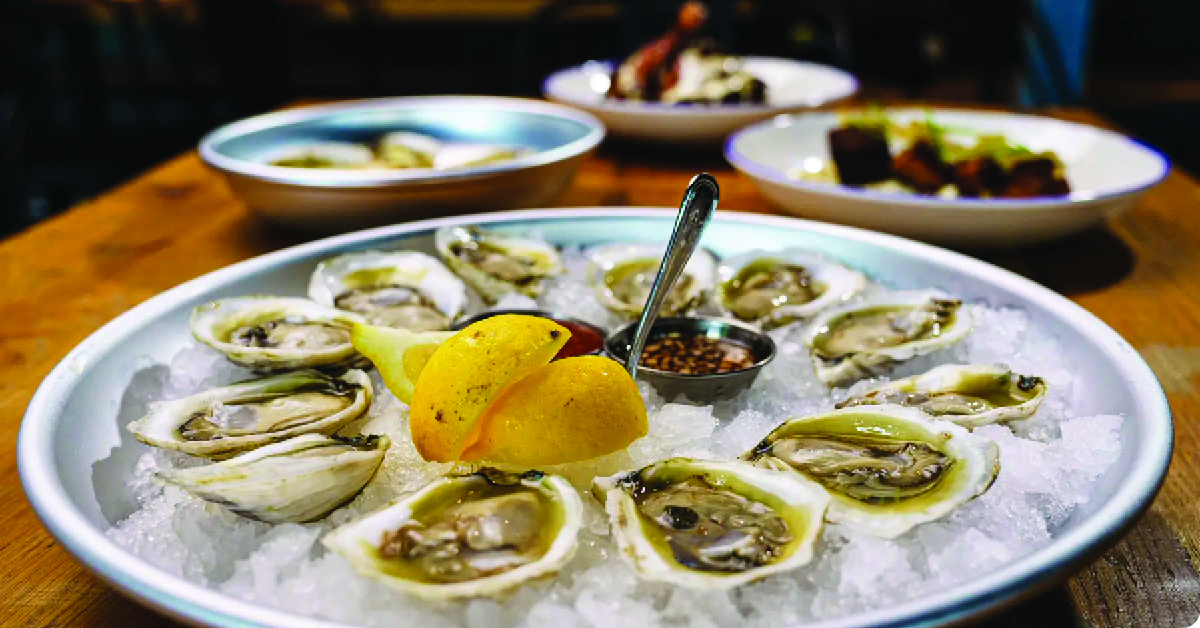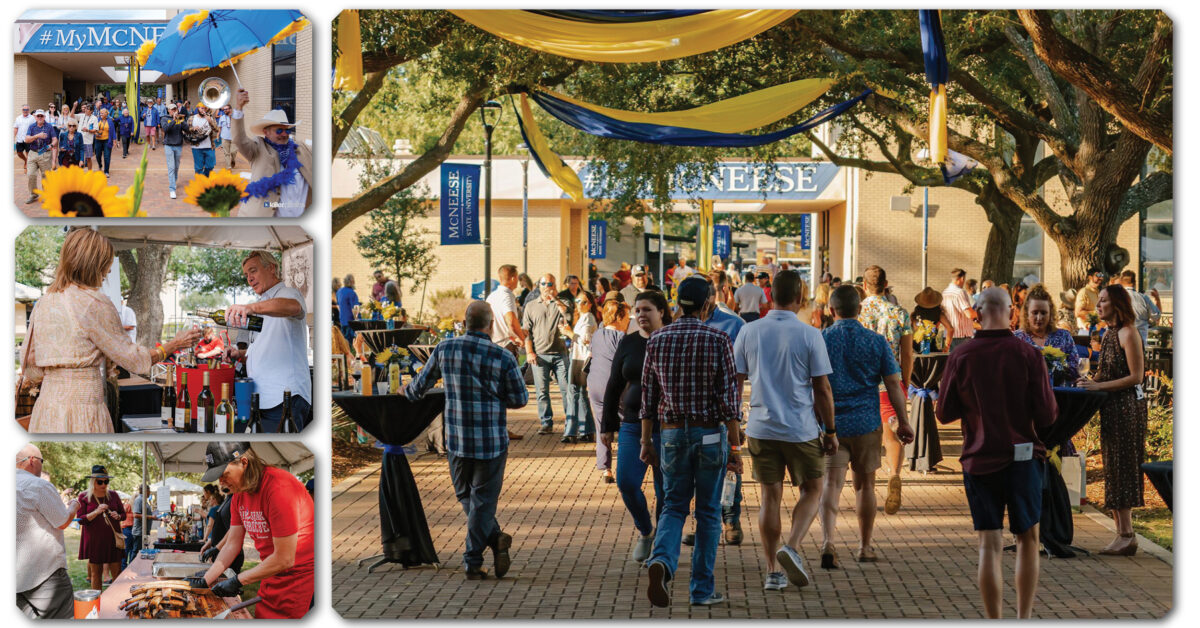
Claims Clash: The Importance of the Right Insurance Agent
September 2024
Smoke & Barrel Cocktail Royale Cocktail Competition
October 2024by Angie Kay Dilmore
Both seasoned chefs and restaurateurs, Ben Herrera and David Sorrells have joined culinary forces and created something unique and brand new in Southwest Louisiana. Salt Revival Oyster Company is the name of both their oyster farm at the Alternative Oyster Culture (AOC) Park in Cameron Parish AND their recently opened oyster house in Lake Charles.
The pair first worked together after the 2008 fire at what was then Herrera’s restaurant, DeAngelo’s (now 121 Artisan Bistro). Sorrells helped Herrera get DeAngelo’s back up and running. Later, Sorrells ventured out and opened Restaurant Calla. And it was there in Calla’s kitchen that Sorrells developed a passion for oysters that would lead him down a lengthy road of research, legal reform and ultimately another restaurant.
The story of how Salt Revival came to exist began in 2012 when the state of Louisiana approved oyster farming as an alternative way to grow oysters (in floating cages rather than harvesting naturally grown oysters from the muddy water bottoms.) Sorrells watched that development and thought it was interesting. He was also a bit disgruntled with the lack of available fresh seafood locally, especially living on the coast. So he channeled his enthusiasm for oysters into research and advocacy for the oyster farming industry. “After the BP oil spill in 2008, many farmers who had their leases shut down in other parts of the state came to Lake Calcasieu because it was public grounds, which enabled them to harvest and sustain themselves,” Sorrells says. “But over time, it wasn’t sustainable. Basically, they raped and pillaged our water bottom which led to a decrease in commercial and recreational fishing. My passion was to help re-establish our ecosystem as well as produce great oysters in our area. I found that our waters produce some of the best seafood in the country.”
By 2019, Sorrells was ready to open his own oyster farm, but he couldn’t do it legally. The oyster grounds in Calcasieu Lake are public waters regulated by Louisiana Dept. of Wildlife & Fisheries (LDWF), limiting what can be done there.
Sorrells was on a mission. He met with LDWF leaders, state representatives, and officials from the Louisiana Dept. of Health. He brought in Clair Marceaux, then Cameron Port director, and later current Port director Kim Montie, both champions for Sorrells’ project. “It started out as a grassroots effort, and we ultimately got the state legislation changed so we could get 40 acres of water taken out of the public grounds and put into private ground owned by LDWF and governed by the Cameron Parish Port Authority,” Sorrells says. The process took four years.
Fast forward to 2024 . . . the AOC opened this past spring, inviting oyster farmers, including Sorrells, to lease plots in which to grow oysters for commercial markets. Sorrells established Salt Revival Oyster Company and brought in three partners, including Ben Herrera.
Now that he was successfully growing high-quality oysters and shipping them to markets across the south and beyond, Sorrells thought maybe it was time to open another restaurant. Being busy with the new farm, he needed a partner and asked Herrera to join him. Initially reluctant to open a new establishment, having just closed The James 710, Herrera says one thing led to another, opportunities presented themselves, and when they realized the potential of the former Mellow Mushroom location, everything came together. “And here we are!” says Herrera.
Salt Revival Oyster Co. opened with great fanfare mid-August, and the chefs, servers, and oyster shuckers have been busy since day one. Having been in the restaurant business for many years, Herrera was expecting a good response with the opening, and the community did not disappoint. He says the location is perfect for a long-anticipated oyster bar in Lake Charles, commenting on the large space, huge patio with adjacent garage doors, a stage, great layout, two bars (they turned one bar into an oyster bar) and a mechanical glass window that can separate the openness. “The space screams volume and the bones are phenomenal. It’s the first restaurant space I’ve seen in 30 years that’s done right.”
Herrera adds that some diners have noticed the smaller size of the AOC oysters. Louisianans are accustomed to larger oysters, but the smaller size is attributed to the type of oyster and how they are grown. Because they’re in floating cages and not in the bottom mud, they have more access to the nutrient-rich water, they grow faster, and they’re impeccably clean. Herrera says once patrons taste his oysters, any criticism over the size is appeased by the superior quality.
Another complaint might be Salt Revival’s limited menu, but Herrera says this too is by design. “When restaurants put too many items on a menu, it looks good, it reads well, but the execution isn’t there. It’s hard to produce a large menu and do it well. Our menu is simple. We wanted it to be an old school, southern oyster house.” Most popular menu items so far: raw and charbroiled oysters, crab dip, bespoke fish dip, pork belly, fried shrimp . . . and save room for the fig cake! What’s in the works? Mobile ordering, live music, daily hours, better televisions for sports watching, private parties, and an expanded parking lot.
Back at the AOC, Sorrells says there are currently 1.2 million oysters on the farm. They hope to have 3-5 million over the next five years, but don’t have a ceiling in mind. “Oysters seem to be an industry that is in high demand.”
Herrera and Sorrells intend to use Salt Revival as a platform to put Southwest Louisiana on the map not only for superior seafood, but also as a means to enhance the coastal environment. “Other than being at the mercy of Mother Nature, it’s a sustainable crop and we don’t use feed, pesticides, or fertilizers,” Sorrells adds. “We save all our shells from the restaurant for use to build new oyster reefs and shorelines to prevent coastal erosion. It’s bigger than just an oyster farm for us. It’s about replenishing our ecosystem. Oysters are the foundation. When you get the oysters, you get the shrimp, the crabs . . . we know it won’t happen overnight, but we want to be a part of making our area a place that people are drawn to.”
Herrera describes himself and Sorrels as two passionate chefs who felt they had it in them to do one more project – farming oysters and bringing them to the table not only for Southwest Louisianans to enjoy but people from all over the state. Bravo, gentlemen!






